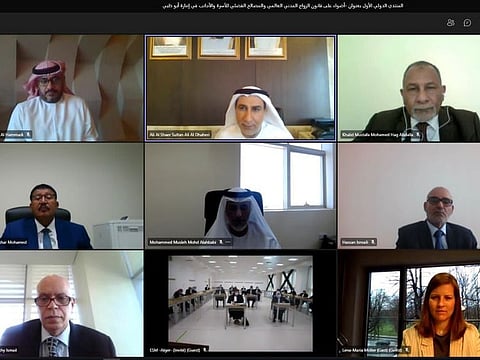Abu Dhabi Judicial Department organises forum on personal status law for foreigners
Issues of marriage, divorce, child custody and wills for foreigners covered by new law

Abu Dhabi: The Abu Dhabi Judicial Department (ADJD) recently organised a virtual international forum on family and civil matters for foreigners in Abu Dhabi.
The online forum, titled ‘Lights on the International Law on Civil Marriage and the Best Interest of the Family and Foreigners in the Emirate of Abu Dhabi’, explained the implementation mechanism of Law No. 14 of 2021 concerning’ Civil Marriage and its Effects in the Emirate of Abu Dhabi’. The forum also covered the competence of the Civil Family Court to handle cases of marriage, divorce, child custody, wills and inheritance for foreigners or non-Muslim nationals covered by the provisions of this law.
In his opening speech at the forum, Counsellor Ali Al Shaer Al Dhaheri, Director of the Judicial Inspection Division at the Judicial Department, said the enactment of the Civil Marriage Law and the regulations governing all matters related to the personal status of foreigners, is intended to enhance the position and competitiveness of the emirate as a destination for talented professionals.
He added that the forum aimed to discuss all executive procedures in accordance with the provisions of the law and regulations related to civil marriage and divorce procedures, in line with the vision of Sheikh Mansour bin Zayed Al Nahyan, Deputy Prime Minister, Minister of Presidential Affairs and Chairman of the Abu Dhabi Judicial Department, to consolidate a pioneering judicial system that keeps pace with changes and developments.
Speaking at the forum, Dr Lena-Maria Möller, an international expert in family law at the Max Planck Institute for Comparative and International Private Law, said the recent legislative developments in the UAE, particularly those related to family and children’s laws, and their role in protecting right have a bearing on the stability of society and the upbringing of generations in an appropriate manner.
Child custody matters
Dr Möller reviewed the articles of the Civil Marriage Law and its Effects in the Emirate of Abu Dhabi and its implementing regulations, with emphasis on the provisions concerning joint custody of children after divorce; the method of rotation and sharing of custody between the father and mother; and how to object to it if there are reasons to do so; and the cases of forfeiture of joint custody, whether temporary or permanent, if any of the cases detrimental to the interests of the child occur, with details of how to seek the intervention of the court in the event of disagreement over any decision concerning the child after the divorce.
She also spoke about how the comprehensiveness of the implementing regulations deal with the competence of the Civil Family Court to decide on claims and disputes related to civil marriage and its effects. These include financial rights arising out of divorce, custody of children, wills, civil succession, proof of filiation, and other issues related to the personal status of foreigners, as well as civil marriage procedures and the conditions for its conclusion, civil divorce procedures (no-fault divorce), which is based on the equal rights of both spouses to file for divorce without prejudice to the wife’s financial rights in the divorce.
Dr Ahmed Abdelzaher, legal advisor at the Technical Office of the Undersecretary of the ADJD, discussed the scope of implementation of the law and the criteria for determining jurisdiction, in accordance with the recent amendments, which stipulate that in the event that the marriage takes place in accordance with this law, the latter will be applied for all the effects of the marriage and its dissolution, as well as for the wills and inheritance of those covered by its provisions, when the bequest or money bequeathed to them is inside the country.
Sign up for the Daily Briefing
Get the latest news and updates straight to your inbox


